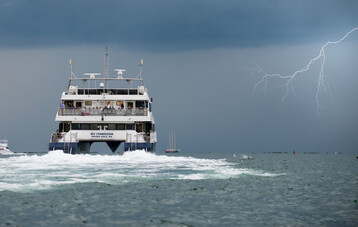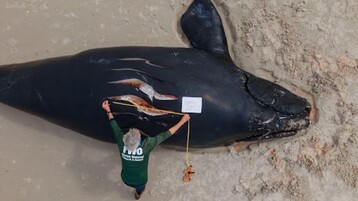Steamship Will Formally Oppose New Vessel Speed Restrictions
Jason Graziadei •

The Steamship Authority's Board of Governors will formally oppose the proposed seasonal speed restrictions under consideration by the National Oceanic and Atmospheric Administration (NOAA) to protect critically endangered right whales.
Steamship Authority general manager Bob Davis told his board on Tuesday that the current proposal would force the boat line to either add another crew - raising operating costs by a third - or reduce the number of trips by its traditional car ferries.
"Obviously if we cut back to only two trips per day, it would have a devastating impact on Nantucket's economy," Davis said.
The “proposed North Atlantic right whale seasonal speed zones” would apply to most vessels over 35-feet long from Nov. 1 through May 30, restricting their speed to no more than 10 knots (about 11.5 mph). As it's written, the new rule would apply to all Hy-Line Cruises and Steamship Authority vessels, and effectively eliminate high-speed ferries during those months.
Davis said the Steamship recognizes the importance of measures to protect right whales from boat strikes, but emphasized that the regulations exempted areas like Long Island Sound and Buzzards Bay, but not Nantucket Sound. He repeatedly stated that the Steamship Authority's captains had never encountered a right whale in Nantucket Sound.
"In the 22 years since we've been running high-speed service for both (Nantucket and Martha's Vineyard) routes - 500,000 trips back and forth between the two islands - during that time none of our crews have documented seeing any right whales in the Sound," Davis said. "We feel that area should be excluded much like Long Island Sound is excluded and Buzzards Bay is excluded."
The Steamship Authority is preparing a formal statement that will be submitted to NOAA and the National Marine Fisheries Service, a draft of which was considered by the board on Tuesday.
"The imposition of the speed zones without sufficient scientific data appears to be an arbitrary decision that warrants further support from stakeholders that operate in those waters," the draft statement reads. "The Authority is more than willing to support the federal government’s efforts to obtain more data on the impacts that its ferry operations might have upon right whale habitat, but an across-the-board reduction on vessel speeds, although simple in articulation, is impractical and negatively impactful to the Authority’s operations and more importantly, to the island residents, which it is mandated to serve."

The proposed rules have been put forward by NOAA Fisheries to reduce the risk of lethal vessel collisions with endangered North Atlantic right whales. Current estimates peg the North Atlantic right whale population at less than 350 individuals remaining, and scientists believe they are highly susceptible to vessel strikes given their distribution and frequency at near-surface depths, especially for mother and calf pairs.
“Collisions with vessels continue to impede North Atlantic right whale recovery,” said Janet Coit, Assistant Administrator for NOAA Fisheries. “This proposed action is necessary to stabilize the ongoing right whale population decline, in combination with other efforts to address right whale entanglement and vessel strikes in the U.S. and Canada.”
But as Davis mentioned at Tuesday's meeting, right whales have been documented extensively south of the island, but not in Nantucket Sound.
Hy-Line Cruises president Murray Scudder joined Tuesday's meeting remotely to renew his concerns, and urged the Steamship Authority's Board of Governors to join him in speaking as "one voice" in opposition to the proposal.
"This would set back the islands, particularly Nantucket, 50-plus years," Scudder said. "As currently proposed, this regulation eliminates high-speed service. It would remove us from the equation."

The proposal from NOAA would approximately double the area under speed restrictions along the East Coast, and the changes would disproportionately impact the Northeast/Mid-Atlantic area, whereNOAA believes substantial strike risk remains unaddressed.
There have been four lethal (death and serious injury) right whale vessel strike events in U.S. waters since 2020, according to NOAA.
“We have made progress in addressing the threat of vessel strikes, but additional action is warranted to further reduce the risk of lethal strike events to ensure the species can get back on track to recovery,” said Kim Damon-Randall, Director, Office of Protected Resources, NOAA Fisheries.
Nat Lowell, Nantucket’s representative on the Steamship Authority’s Port Council, emphasized the island's reliance on high-speed ferries in the off-season for things like the high school sports teams that travel off-island for games.
"The fast boat has become the slow boat in terms of how normal it is and how integrated into life it is," Lowell said. "For something like this to come up, it's beyond the comprehension for anyone under 50, to realize what would happen.
This is moving Hyannis another 10 miles away and turning us back years."
The current mandatory 10-knot speed restrictions implement in specific areas/times off the East Coast apply only to vessels over 65 feet. The new rule would broaden the restrictions to include vessels over 35 feet, as well as expand the areas covered by those speed zones.
Certain vessel categories are exempt - including military, search and rescue, and enforcement - and there is a provision to allow vessels to exceed 10 knots during certain weather conditions that severely impact maneuverability.
NOAA estimates 15,899 vessels would be impacted by the new proposed speed zones, and of those, 59 percent are recreational/pleasure, 22 percent are ocean-going ships, while the other 19% are commercial, industrial, or “other.”
The comment period in which citizens, businesses, organizations and governments can submit response to the proposed rules is now open. In response to numerous requests for an extension, the National Marine Fisheries Service recently announced an extension of the public comment period by an additional 30 calendar days ending on October 31, 2022.